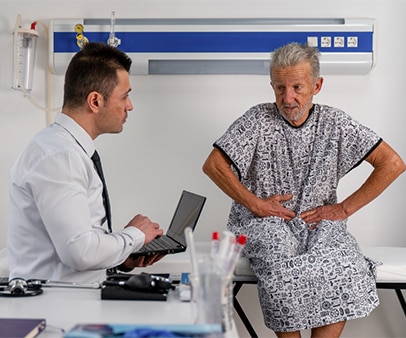Did you know… men have a 25% chance of developing a hernia during their lifetime, compared to only 2% of women.1
Due to the male anatomy, there are holes or gaps in the groin muscles to ensure blood is able to move to the reproductive organs. Additionally, as a man gets older, his abdominal wall weakens in that same area, increasing the risk for developing a hernia.1
Most Common Hernias in Men
- Inguinal Hernia: Inguinal hernias (or groin hernias) occur when part of your bowel protrudes into the passageway that runs down your inner thigh (the inguinal canal).2 They are 8x more likely to affect men or people assigned male at birth (AMAB) than women—70% of hernias developed in men are inguinal.3,4 While inguinal hernias aren’t necessarily dangerous, they can lead to life-threatening complications. Should your inguinal hernia cause pain or become enlarged, your doctor may recommend surgery. There are two types of inguinal hernias:
- Indirect Inguinal Hernia: The most common type of inguinal hernia and often caused by problems with the abdominal wall, typically present from birth.5
- Direct Inguinal Hernia: Unlike indirect inguinal hernias, direct inguinal hernias penetrate directly through the wall of your inguinal canal.2
- Incisional Hernia: An incisional hernia typically develops after abdominal surgery for reasons including (but not limited to): excessive or premature postoperative physical activity; considerable weight gain; and increased abdominal pressure before the incision is healed. Incisional hernias are most likely to occur within 3-to-6 months post surgery, but can happen at any time.6
- Umbilical Hernia: An umbilical hernia in men is caused when part of the bowel or fatty tissue pushes through a weak spot in the abdominal wall and creates a soft bulge near the naval which can become tender and painful.5 It may be present from birth, but oftentimes it does not show up until later in life—usually accompanied by weight gain.3
Symptoms of a Hernia3
- Pain or discomfort at the site of the bulge
- Pain while lifting a heavy object
- Swelling or bulge
- Increase in the bulge as time passes
- Dull aching sensation
- Sense of feeling full or a bowel obstruction
Any type of pain is worth a visit to your healthcare provider. If you think you’re dealing with hernia pain, it’s important to have a healthcare provider diagnose whether your pain is related to a hernia or another condition. Should you experience symptoms including fever, nausea and vomiting, seek medical attention right away.
The guidance provided in this article follows general rules that should be discussed with your doctor. This article is for informational and educational purposes only. It does not substitute for medical advice. If in doubt, always consult your doctor.
Related Articles
Join the HerniaInfo.com community! Get notified about our latest articles and updates on all things hernia as they become available.


